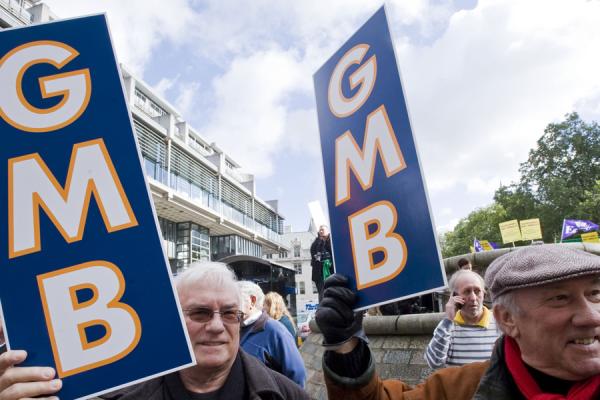GMB call for plan to end social care funding lottery

GMB, the union for care home workers, has published an analysis to show the impact raising council tax by 8% will have on residents in the South East of England.
An 8% increase in Council Tax across the board has very different yields per head, for example £44.5 per head in Wokingham compared with £24.6 in Portsmouth. The other areas in the South East with the highest difference per head of an 8% increase in council tax are: Wokingham with £44.5 difference, West Berkshire with £44.2, Isle of Wight with £42.6, Surrey with £42.3 and Buckinghamshire with £37.1.
The 5 areas in the South East with the lowest difference per head of an 8% increase in council tax are: Portsmouth with £24.6, Southampton £26, Slough £26.8, Medway £29.3 and Kent £30.6.
In the 2015 spending review, authorities with social care responsibilities were given the flexibility to raise council tax in their area by up to 2% above the referendum threshold for each year between 2016-17 and 2019-20, to fund adult social care services.
Recent reports suggest that Sajid Javid, Communities and Local Government secretary will give councils the right to increase the council tax precept further in an attempt to plug the social care black hole.
Set out in the table below are the 2016-17 Council tax requirement figures with an extra 8% added and the council tax figures per head of population. The table has been compiled by GMB Southern region using official data from the Department for Communities and Local Government, see notes to editors for sources and definitions.
| rank | Council tax requirement + 8% (£) | Council tax per head current requirement (£) | Council tax per head 8% increase (£) | Yield per head from 8% increase (£) | |
| 1 | Wokingham | 96,364,245 | 556.2 | 600.7 | 44.5 |
| 2 | West Berkshire | 93,033,652 | 552.1 | 596.3 | 44.2 |
| 3 | Isle of Wight Council | 80,094,059 | 532 | 574.6 | 42.6 |
| 4 | Surrey | 666,838,541 | 528.3 | 570.5 | 42.3 |
| 5 | Buckinghamshire | 264,797,489 | 464 | 501.1 | 37.1 |
| 6 | West Sussex | 412,846,781 | 457.1 | 493.7 | 36.6 |
| 7 | Oxfordshire | 330,368,625 | 451.3 | 487.4 | 36.1 |
| 8 | Reading | 78,267,950 | 448.1 | 483.9 | 35.8 |
| 9 | East Sussex | 262,041,928 | 446 | 481.6 | 35.7 |
| 10 | Bracknell Forest | 56,971,592 | 443.4 | 478.8 | 35.5 |
| 11 | Brighton & Hove | 129,627,880 | 420.7 | 454.4 | 33.7 |
| 12 | Windsor and Maidenhead | 66,972,425 | 419.8 | 453.4 | 33.6 |
| 13 | Hampshire | 575,272,234 | 393.7 | 425.2 | 31.5 |
| 14 | Milton Keynes | 110,954,322 | 392.5 | 423.9 | 31.4 |
| 15 | Kent | 629,835,694 | 382.5 | 413.1 | 30.6 |
| 16 | Medway | 109,259,472 | 365.9 | 395.2 | 29.3 |
| 17 | Slough | 52,789,800 | 335.4 | 362.2 | 26.8 |
| 18 | Southampton | 87,491,812 | 324.6 | 350.6 | 26 |
| 19 | Portsmouth | 70,446,160 | 308 | 332.7 | 24.6 |
Paul Maloney, GMB Southern regional secretary, said, “It is a complete lottery as to who among the 1 in 15 of UK residents will end up in a care home. What should not be a lottery is how that care is paid for. We well know that it is equally a lottery as to who suffers from health conditions but that is paid for from general taxation.
The only fair way of paying for the lottery of those in a care home is for the money to come out of general taxation.
The founders of the NHS envisaged a cradle to grave service but Mrs Thatcher changed that to a cradle to care home door service. This has introduced the lottery as to which families are burdened with meeting these costs and for councils to meet the costs where the family cannot meet them.
Not raising money from general taxation to pay for social care is inherently unfair. To now seek to raise the money via council tax is to compound the unfairness. Not all councils can yield the same money per head as the table above shows.
Privatisation of gas, electricity, water, telecommunication, transport and the post office has robbed proper funding of our public services especially care and health and instead of profits going towards public services the money is going into the pockets of shareholders and the elite.
It is not too late for the government to come forward with a comprehensive and wide ranging plan to make sure that the elderly and vulnerable in our society are paid for in a fair and responsible manner from general taxation.”
Contact: Paul Maloney on 07801 343839 or Michelle Gordon on 07866 369259
Notes to Editors:
1 Source: Council Tax levels set by local authorities in England 2016 to 2017, table 9: 2016 to 2017 Council Tax requirement and chargeable dwelling figures.



